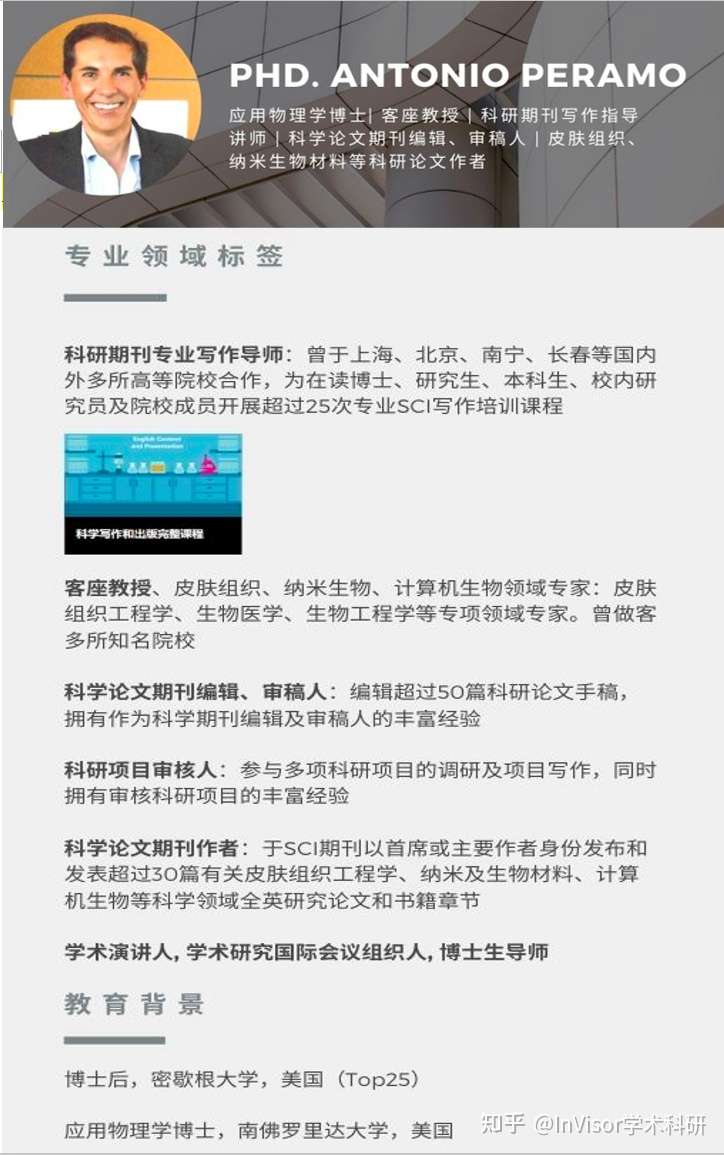和美国Top25大学博士后的10个学术科研快问快答

牛X!比Sci-hub更稳定的文献下载神器!
2021年4月13日
科普短文 | 植物为什么是绿色的?
2021年5月7日和美国Top25大学博士后的10个学术科研快问快答

芳老师今天很荣幸约到了InVisor导师Antonio Peramo的在线采访!根据时差和教授的空闲程度,确定个采访时间实在太不容易了TAT 所以请大家走过路过别忘了给InVisor芳老师我点个赞哦!
导师Peramo背景:
- 美国密歇根大学(美国Top 25)博士后
- 曾在北京、上海等国内高校担任客座教授,举办专注于期刊论文写作、公众学术演讲的workshop

Q1:哪些指标可以帮助科研新手快速筛选适合投稿的期刊?
A1:The fastest would be the Impact Factor (IF). However, you should look at the list of references in your own manuscript to have a quick selection of possible journals, assuming you are looking for the journal after you have written your manuscript.
翻译:最快的方法是看期刊的影响因子。如果在写完论文之后才开始寻找期刊的话,可以再参照一下自己的参考文献目录去找合适的期刊。(选刊前必看的推文请戳↓)
InVisor学术科研:发表论文前推荐阅读:影响因子和它小伙伴的故事(上)
InVisor学术科研:发表论文前推荐阅读:影响因子和它小伙伴的故事(中)
InVisor学术科研:发表论文前推荐阅读:影响因子和它小伙伴的故事(下)
Q2:期刊接受率真的真的很重要吗?
A2:Yes. The acceptance rate is affected by the IF, the highest the IF, the lower the acceptance rate, so it is more difficult to get a paper accepted. But the “success rate” may refer to other parameters, like editorial times (aka. the total time it takes for the journal to accept the manuscript. Normally is from submission to acceptance) or desk rejections.
翻译:非常重要。期刊接受率和影响因子(IF)挂钩,IF越高,期刊接受率越低。顾名思义,期刊接受率越低,论文就越难被期刊接受。但是最终你的投稿成功率还和投稿周期,以及是否在审稿人审阅之前就被拒挂钩。
Q3:打算发表论文前需要做什么准备工作?
A3:Make sure the quality of work, good preparation of experiments, good long-term publication planning.
翻译:确保论文的质量,好好准备实验,要有长期的发表规划。
Q4:我的英文水平一般般,写不好全英论文怎么办?
A4: Practice. Read literature in English not related to scientific journals to improve vocabulary. Read in other fields of science. It will improve over time, but it is not something you can improve very quickly.
翻译:多练。读和学术期刊关系不大的英文文学提高词汇量,涉猎其他科学领域的东西。英文水平的提升需要时间。
Q5:什么样的论文更加受期刊编辑青睐?
A5: The typical response here is something surprising, counterintuitive, novel or that contradicts established results. But it is best to look at the journals highlights section.
翻译:回答可能会让人比较惊讶,编辑喜欢那种违反直觉的、新奇的或者和现有学术成果相反的论文。不过还是建议最好去看看期刊官网自己写的highlight(通过诸如editor highlights,editor choice去迎合编辑的喜好)。
Q6:我搞了一个大project,可以把研究成果分开写到不同的paper里,多发几篇吗?
A6: Yes in two cases: if you are using a different set of results for each paper, and these results do not form a completely coherent set of values, otherwise you will be “slicing” your results, which technically is research misconduct. The other situation is to do a separate analysis of the same results in a way that would not possible or make sense to put together in a single paper. The first situation is more common.
翻译:在两种情况下可以。一种是你在不同的论文中用不一样的实验数据和结果,即是说同一套试验方法或理论来做不同的测试,得出的实验结果是不同的数值,而这些不同的数值之间没有联系性,实验是分开的、不相关的;另一种是对同一个结果,在不同的论文中做出不同的分析,而这些不同的分析不太可能被塞进一篇论文里面。第一种情况总体来说比较常见。
Q7:写好论文后怕被心仪期刊拒稿,可以一稿多投吗?
A7: No, for as long as your paper is “in review” with the first journal. But you can withdraw your submission at any time.
翻译:不可以,只要你的期刊已经处于审阅中的状态了,就不可以。但你可以随时撤回你的投稿。
Q8:如果我不同意审稿人给的建议,或者审稿人大大要求我多做点实验,怎么办?
Q8: 1) If you do not agree, you need to say so in your response letter and the reason why. If the explanation is reasonable, reviewers and editors will accept it (normally). 2) If they ask to do more experiments, you can perform the experiments if you have time and money, or you can say that you do not have time nor money. However, if the requested experiments are fundamental to explain your results, you may have no other choice.
翻译:如果你不同意审稿人的建议,就在你的回信中说明并且阐释理由。一般来说只要你的解释合理,审稿人和编辑都会接受;如果审稿人要求你多做一些实验,那你有钱有时间的话可以去做,或者你可以说你没有钱或时间(苦笑)。但是,如果这个实验是解释你的结论的基础,那你不做也得做。
Q9:如果我很牛,我可以自己当编辑,自创期刊吗?
A9: Everyone can become an editor over time, assuming you have published enough and want to get involved doing it, which is time-consuming. Starting an independent journal is now easier than ever, there are platforms that will facilitate doing that. It actually cost not much money. But again, it is a business and time-consuming to do.
翻译:每个人随着时间和经历的累积都可以成为编辑,比方说你已经发表了很多论文而且你想要参与这个过程。现在创期刊比以前都来得简单,也有一些平台可以帮你做。而且也不用花多少钱。但是这是一个生意口,而且很费时间。
Q10:科研人的核心素养?(尤其是生物、医药等自然科学领域的学生)
A10: I would say link with current and very futuristic trends: link disease with climate change; antimicrobials; better vaccines; aging applications; limiting excessive health biomonitoring, since too much data provides erroneous analyses; AI tools (personal choice).
翻译:紧跟行业热点和未来趋势,比如疾病和气候变化的联系、抗菌剂、更好的疫苗、人口老龄化社会问题的技术解决方法、限制过度使用大数据手段获取个人信息(如个人健康及生物指标信息,因为这些生物指标可能随着时间而改变,而系统可能不及时更新,造成系统对于个体身体状况的错误记录或标签化)、AI工具等。
(之后的深度采访中,Peramo教授还提到了:多看高影响因子期刊和自己想要投的期刊;诚信、有耐心、有韧性,聪明、勤奋、自律~)
快速手动点收藏啊!!喜欢记得敲敲屏幕,点赞转发评论三连~
更加详细的论文写作和投稿攻略,请关注Peramo教授开发的“Scientific Writing Courses专业科研写作课程”(报名课程请添加芳老师vx:invisor003,备注:SCI课程)
InVisor学术科研:专业科研写作免费体验课!迈出发表国际核心期刊第一步
祝愿各位同学如愿以偿发表高含金量论文!!!
(而被期刊拒稿的同学也不要心灰意冷,Peramo教授还说:如果被这个期刊拒稿了那就不要再投了,换其他的期刊,你的萝卜总会找到自己的坑,别吊死在一个期刊上。而且,被拒稿是科研人生活常事,教授本人也被拒了很多次。咱不是不优秀,只是不合适。)
欢迎大家持续关注InVisor学术科研!喜欢记得点赞收藏转发!双击屏幕解锁快捷功能~
如果大家对于「SCI/SSCI期刊论文发表」「SCOPUS、CPCI/EI会议论文发表」「名校科研助理申请」等科研背景提升项目有任何想法的话,十分欢迎大家来戳一戳芳老师(一般人芳老师是不会告诉ta客服微信滴:invisor003)❤️


